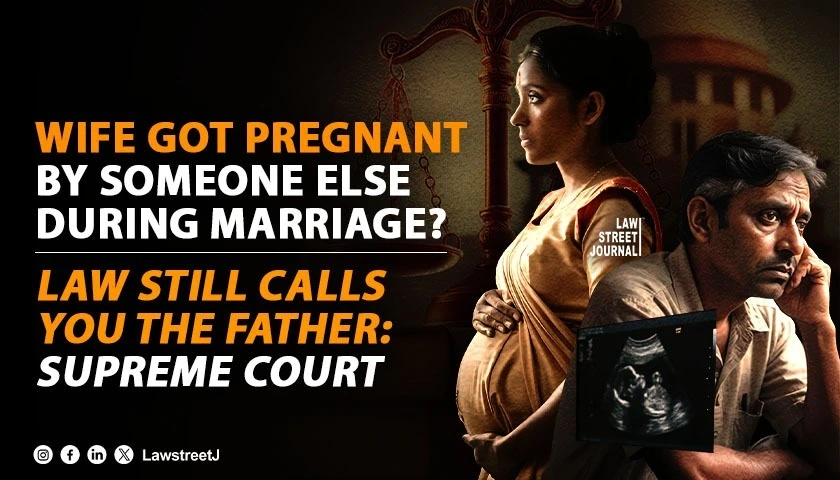NEW DELHI: Any child born during the subsistence of marriage is presumed to the son of his or her mother's husband and no DNA test can be ordered merely on allegations of adultery.
In a judgment in Ivan Rathinam Versus Milan Joseph, the Supreme Court has said there exists a strong presumption under the law that the husband is the father of the child borne by his wife during the subsistence of their marriage and an order necessitating a DNA test based on mere allegations of adultery, would ultimately violate the right to dignity and privacy.
The court had then declared legitimacy of a child determines paternity under the law until this presumption is successfully rebutted by non access.
"Legitimacy determines paternity under Section 112 of the Indian Evidence Act, 1872, until the presumption is successfully rebutted by proving ‘non-access’," the court emphasised.
The bench, which comprises Justices Surya Kant and Ujjal Bhuyan, has rejected the Kerala High Court’s view that ‘paternity’ can be determined independent of the concurrent findings regarding the legitimacy of the child, saying such a view cannot be sustained.
The court held that it is not correct to hold that a man's legitimate interest to know his father outweighs the infringement of another man's right to privacy and dignity. It said the challenge raised before the High Court that ‘paternity’ and ‘legitimacy’ are distinct or independent concepts is a misdirected notion and is liable to be rejected.
The court allowed a man's plea against the High Court's 2018 order which upheld a family court's 2015 order that revived maintenance claim of a 23-year-old youth against the appellant on the ground that he was begotten by the appellant out of her mother's extra marital relationship in 2001 during the subsistence of her marriage.
The bench said that scientifically and technically, a legitimate child, i.e. one born during the subsistence of a valid marriage between two persons, may not always be the biological child of the persons in the marriage.
"In our view, it would be possible and easy to contemplate such a situation arising, which leads us to the postulation that in a more technical sense, the terms ‘legitimacy’ and ‘paternity’ may indeed undertake different meanings," the bench said.
The courts around the globe have recognised the theoretical difference in ‘paternity’ and ‘legitimacy’ to the extent that in the Venn diagram of paternity and legitimacy, legitimacy is not an independent circle, but is entombed within paternity, the bench said.
"The advent of scientific testing has made it much easier to prove that a child is not a particular person’s offspring. To this end, Indian courts have sanctioned the use of DNA testing, but sparingly," the bench said.
Section 112 of the Indian Evidence Act, the bench said, makes it abundantly clear that there exists a strong presumption that the husband is the father of the child borne by his wife during the subsistence of their marriage.
"The object of this principle is to prevent any unwarranted enquiry into the parentage of a child. Since the presumption is in favour of legitimacy, the burden is cast upon the person who asserts ‘illegitimacy’ to prove it only through ‘non-access'," the bench said.
While parties may be on non-speaking terms, engaging in extra-marital affairs, or residing in different houses in the same village, it does not necessarily preclude the possibility of the spouses having an opportunity to engage in marital relations, it said.
The court explained, non-access means the impossibility, not merely inability, of the spouses to have marital relations with each other.
"For a person to rebut the presumption of legitimacy, they must first assert non-access which, in turn, must be substantiated by evidence," the court said.
It is only when such an assertion is made, that the court can consider the question of ordering a DNA test to establish paternity, the court said.
In the case, when the respondent was begotten in 2001, his mother was married with the person. In fact, they had been married since 1989 and neither had ever questioned the validity of the marriage. They were, admittedly, living under the same roof from 1989 till 2003, when they decided to separate. It is, but obvious, that the respondent’s mother and the man had access to each other throughout their marriage.
This conclusion has been arrived at through concurrent findings of all the courts involved, at multiple stages of litigation, the bench said.
The bench said even if it is assumed that the respondent’s mother had relations with the appellant during her marriage and especially when the respondent was begotten, such a fact per se, would not be sufficient to displace the presumption of legitimacy. The only thing that such an allegation sheds light on is the fact that there seems to have been simultaneous access with the respondent’s mother, by the appellant and her husband.
"What, however, needs to be clarified is that an ‘additional’ access or ‘multiple’ access does not automatically negate the access between the spouses and prove non-access thereof. Consequently, there is a statutory mandate that the respondent must be presumed to be the son of the man (his mother's husband)," the bench said.
In such cases, the bench said, the court must undertake an exercise to ‘balance the interests’ of the parties involved and decide whether there is an ‘eminent need’ for a DNA test.
This pertains not simply to the interests of the child, i.e. the respondent, but also to the interests of the appellant. On one hand, courts must protect the parties’ rights to privacy and dignity by evaluating whether the social stigma from one of them being declared ‘illegitimate’ would cause them disproportionate harm. On the other hand, courts must assess the child’s legitimate interest in knowing his biological father and whether there is an eminent need for a DNA test, the court said.
"A person can exercise his right to privacy in order to protect his right to dignity and vice-versa. Together, these rights protect an individual’s ability to make the most intimate decisions regarding his life, including sexual activity, whether inside or outside the confines of marriage," the bench said.
The court said, forcefully undergoing a DNA test would subject an individual individual’s private life to scrutiny from the outside world. That scrutiny, particularly when concerning matters of infidelity, can be harsh and can eviscerate a person’s reputation and standing in society. It can irreversibly affect a person’s social and professional life, along with his mental health. On account of this, he has the right to undertake certain actions to protect his dignity and privacy, including refusing to undergo a DNA test.
Usually in cases concerning legitimacy, it is the child’s dignity and privacy that have to be protected, as they primarily come under the line of fire, the bench said.
Though in this instance, the child is a major and is voluntarily submitting himself to this test, he is not the only stakeholder bearing personal interest in the results, whatever they may be. The effects of social stigma surrounding an illegitimate child make their way into the parents’ lives as there may be undue scrutiny owing to the alleged infidelity. It is in this backdrop that the appellant’s right to privacy and dignity have to be considered, the bench said.
Moreover, the respondent is already declared to be the legitimate son of the man, his mother's husband, the court said.
"The fishing enquiry, which he wants through the judicial process is seemingly, not meant to bring ‘certainty’ to an uncertain event. Rather, it is predominantly targeted to harm the appellant’s reputation. The respondent knows well who is his ‘father’ as per the law," the bench said.
That apart, the bench said, the courts must also remain abreast with the effects such a probe would have on other relevant stakeholders, especially upon women.
Casting aspersions on a married woman’s fidelity would ruin her reputation, status, and dignity; such that she would be castigated in society, it pointed out.
"Though in this case, the respondent’s mother is actively associated in propagating this vexatious litigation, one can only imagine the repercussions in other cases where a child, in utter disregard to the sentiments and self-respect of their mother, initiates proceedings seeking a declaration of paternity? The conferment of such a right can lead to its potential misuse against vulnerable women. They would be put to trial in a court of law and the court of public opinion, causing them significant mental distress, among other issues. It is in this sphere that their right to dignity and privacy deserve special consideration," the bench said.
The court highlighted that it must be noted that the law permits only a preliminary enquiry into a person’s private life by allowing the parties to bring evidence on record to prove non-access to dislodge the presumption of legitimacy.
"When the law provides for a mode to attain a particular object, that mode must be satisfied. When the evidence submitted does not rebut this presumption, the court cannot subvert the law to attain a particular object, by permitting a roving enquiry into a person’s private life, such as through a DNA test," the bench said.
The court also felt, this convoluted case, spanning over two decades, has no doubt taken its toll on the parties involved and other relevant stakeholders. Given these extenuating circumstances, at this stage, it must be closed for all intents and purposes, the bench ordered.
It held any claim by the respondent based upon the perceived relationship of paternity qua the appellant, stands negated; and the respondent is presumed to be the legitimate son of his mother's husband.
Disclaimer: This content is produced and published by LawStreet Journal Media for informational purposes only and does not constitute legal advice. The views expressed are independent of any legal practice of the individuals involved.















